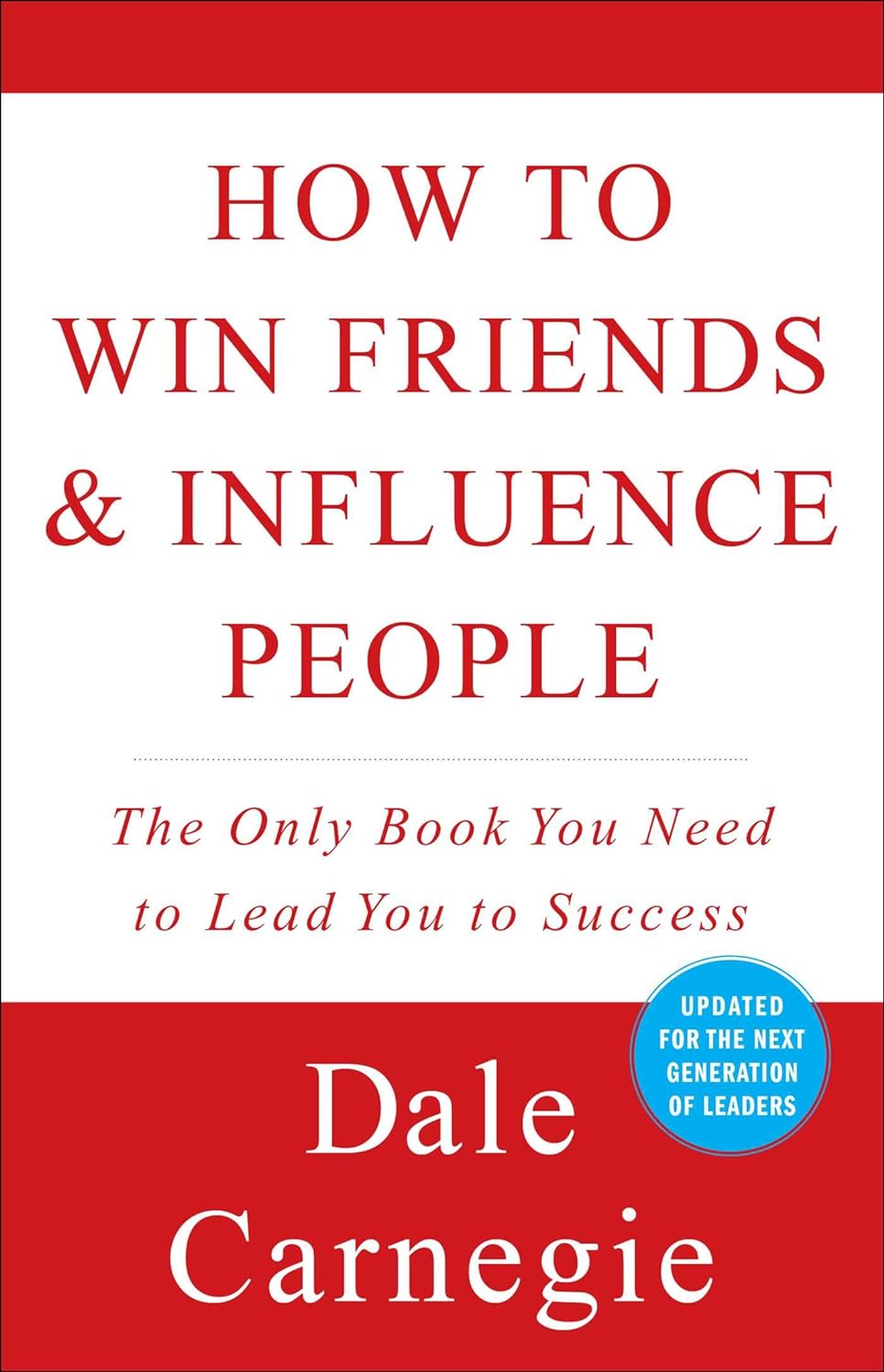Building Positive Relationships
In the pages of "How to Win Friends and Influence People," Dale Carnegie unveils the transformative power of building positive relationships. Like sunshine on a cloudy day, this theme illuminates the essence of human connection, inspiring readers to cultivate genuine and uplifting bonds.
Carnegie emphasizes the significance of empathy and understanding in nurturing relationships. He beautifully states, "You can make more friends in two months by becoming interested in other people than you can in two years by trying to get other people interested in you." These words encapsulate the essence of building positive relationships—a genuine curiosity and appreciation for others' lives, dreams, and aspirations.
The book serves as a guide to effective communication, teaching us the art of active listening and meaningful conversation. Carnegie encourages us to truly hear and understand others, stating, "To be interesting, be interested." By taking a genuine interest in others' stories and perspectives, we foster an environment of trust and connection.
Carnegie's teachings extend beyond surface-level interactions; they delve into the depths of understanding human behavior and motivations. He reminds us that influencing others positively is about aligning their desires with our own, creating win-win situations. As he wisely shares, "The only way to influence someone is to find out what they want and show them how to get it."
The book explores the impact of our words and actions on the people around us. Carnegie teaches us to uplift and encourage others, recognizing the power of kindness and appreciation. He shares, "Be hearty in your approbation and lavish in your praise." These simple yet profound acts of affirmation can work wonders in building and strengthening relationships.
Through captivating storytelling and relatable examples, Carnegie demonstrates the rewards of building positive relationships. He shows us how small shifts in our mindset and approach can lead to extraordinary connections and profound personal growth.
In this radiant exploration of human connection, Carnegie's words act as a gentle guide, urging us to embrace empathy, active listening, and sincere appreciation. By incorporating these principles into our daily lives, we can create a world brimming with warmth, understanding, and lasting relationships.
Effective Communication
Carnegie highlights the importance of active listening, reminding us that true communication goes beyond mere words. He states, "If you want to know how to make people shun you and laugh at you behind your back and even despise you, here is the recipe: Never listen to anyone for long." These words serve as a gentle reminder that listening is not merely waiting for our turn to speak, but a genuine effort to understand others.
The book unravels the secrets to captivating conversation, encouraging us to express our thoughts with clarity and consideration. Carnegie shares practical advice, stating, "The ideas I stand for are not mine. I borrowed them from Socrates. I swiped them from Chesterfield. I stole them from Jesus. And I put them in a book. If you don't like their rules, whose would you use?" These words underscore the importance of drawing inspiration from the wisdom of others while finding our unique voice in the process.
Carnegie also explores the power of empathy in communication. He emphasizes the significance of considering others' perspectives, stating, "The royal road to a person's heart is to talk about the things he or she treasures most." This insight reminds us to engage in conversations that resonate with others' interests and values, fostering a deep connection.
The book is a treasure trove of strategies for resolving conflicts and navigating challenging conversations with grace and tact. Carnegie teaches us the art of criticism without offense, encouraging us to offer constructive feedback with kindness. He shares, "Beginning with praise is like the dentist who begins his work with Novocain. The patient still gets a drilling, but the Novocain is pain-killing." These words serve as a gentle reminder to approach difficult conversations with empathy and understanding.
Through engaging storytelling and relatable examples, Carnegie illustrates the rewards of effective communication. He demonstrates how small shifts in our approach can lead to profound connections, understanding, and resolution.
Influencing Others
Carnegie emphasizes that true influence stems from understanding and meeting the needs of others. He astutely states, "The only way to influence someone is to find out what they want and show them how to get it." These words encapsulate the essence of influencing others—a genuine commitment to empathy, listening, and helping others achieve their aspirations.
The book uncovers the magic of persuasion through kindness and sincerity. Carnegie teaches us that rather than resorting to manipulation or force, we can inspire others through genuine connection and shared values. As he beautifully states, "Actions speak louder than words, and a smile says, 'I like you. You make me happy. I am glad to see you.'" These words remind us that influencing others positively starts with establishing a genuine bond built on trust and respect.
Carnegie also explores the power of praise and appreciation in influencing others. He shares the wisdom, "The difference between appreciation and flattery? That is simple. One is sincere and the other insincere. One comes from the heart out; the other from the teeth out. One is unselfish; the other selfish." These words resonate deeply, underscoring the importance of authentic praise as a tool to inspire and motivate others.
Through captivating storytelling and relatable examples, Carnegie illustrates how ordinary individuals have achieved extraordinary influence by embodying the principles he shares. The book becomes a guiding light, showcasing that we each possess the power to leave a positive imprint on the world through our interactions and influence.
Leadership and Influence
According to Carnegie, true leadership goes beyond authority and control; it stems from a genuine desire to uplift and empower others. He beautifully states, "The successful leader gets superior results by saying, 'Let's go,' not by saying, 'I go.'" These words encapsulate the essence of leadership—a selfless commitment to rallying others toward a common goal, creating an environment where everyone thrives.
The book delves into the power of leading by example. Carnegie reminds us that actions speak louder than words, stating, "Your influence is determined by how abundantly you place other people's interests first." This notion underscores the importance of empathy and understanding in effective leadership. By genuinely caring about the needs and aspirations of those we lead, we inspire them to achieve their full potential.
Carnegie also explores the significance of praise and recognition in motivating and influencing others. He shares the wisdom, "The difference between appreciation and flattery? That is simple. One is sincere and the other insincere. One comes from the heart out; the other from the teeth out." These words remind us that authentic appreciation fuels motivation, fosters loyalty, and builds strong relationships within a team.
Through engaging stories and practical insights, Carnegie presents a roadmap for becoming a leader who inspires and influences others positively. He illustrates how individuals have transformed their leadership style, creating a ripple effect of success and fulfillment. The book becomes a beacon of hope, reminding us that we each have the potential to become extraordinary leaders in our own spheres of influence.
Self-Improvement
Carnegie brings up the importance of continuous self-improvement and the power of a positive attitude. He reminds us, "It isn't what you have or who you are or where you are or what you are doing that makes you happy or unhappy. It is what you think about it." These words encapsulate the essence of self-improvement—an unwavering belief in our ability to shape our own happiness and success through our thoughts and actions.
The book portrays the strategies for managing stress, overcoming self-doubt, and maintaining a positive mindset. Carnegie shares practical advice on handling criticism and transforming it into an opportunity for growth. He states, "When dealing with people, remember you are not dealing with creatures of logic, but with creatures of emotion, creatures bristling with prejudice, and motivated by pride and vanity." These words remind us to approach challenging situations with empathy, understanding the complex emotions that drive human behavior.
Carnegie's teachings extend to the realm of confidence-building and developing assertiveness. He encourages readers to step outside their comfort zones and embrace new opportunities for personal growth. As he wisely shares, "Inaction breeds doubt and fear. Action breeds confidence and courage. If you want to conquer fear, do not sit home and think about it. Go out and get busy." These words serve as a gentle nudge, inspiring us to take bold steps towards self-improvement and embrace the limitless possibilities that await us.
Through engaging stories and practical insights, Carnegie presents a roadmap for personal growth and development. He illustrates how individuals have transformed their lives by implementing the principles he shares. The book becomes a wellspring of inspiration, reminding us that we possess the power to shape our own destiny.
Dealing with People
Carnegie reminds us of the power of treating others with respect and understanding. He reveals, "Remember that a person's name is to that person the sweetest and most important sound in any language." These words capture the essence of dealing with people—acknowledging their individuality and valuing their presence. By using someone's name, we forge an instant connection and demonstrate genuine interest.
The book provides strategies for handling difficult individuals and resolving conflicts with grace. Carnegie shares techniques for defusing tense situations and avoiding arguments. He notes, "You can measure the size of a person by what makes him or her angry." These words remind us to approach challenging individuals with empathy, seeking to understand their motivations and defuse potential conflicts.
Carnegie also explores the power of finding common ground when interacting with people. He encourages us to seek shared interests and focus on areas of agreement. He asserts, "The only way on earth to influence other people is to talk about what they want and show them how to get it." These words underscore the importance of empathy and understanding in building bridges of connection.
Through captivating storytelling and relatable examples, Carnegie illustrates how small adjustments in our approach can lead to profound changes in our relationships. The book becomes a compass, guiding readers toward more meaningful connections and empowering them to navigate the complexities of human interactions.

